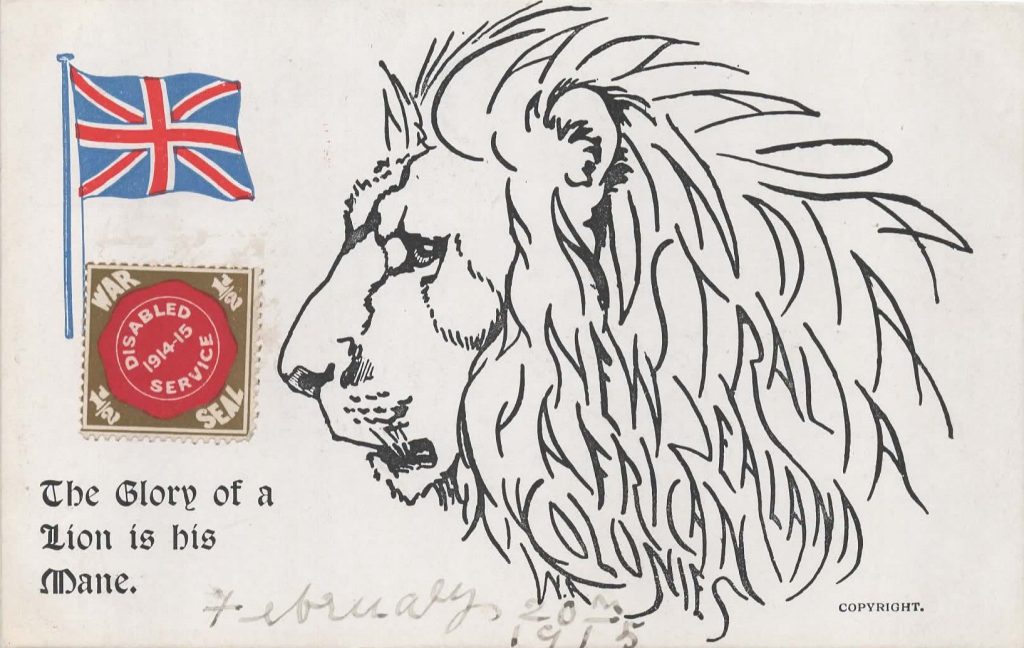Bob Teevan
The Glory of a Lion is His Mane
Every day is a school day for me when it comes to postcards.

On the address-side of the card is the phrase “The Mane Is Not Merely a Glorious Ornament but a Real Protection to a Lion,” and it may be that this astute advisory is speaking to the purchaser that the strength of the British Army is in the commonwealth it enjoys from having real protection from the armies of the countries named.
As mentioned, this is a common card, and it may be that many readers will have a copy or will be familiar with its “hidden message.” There are three of these cards in my collection, but this card has two differences from the others.
First, the address-side of the postcard has more than the phrase mentioned above. It has a full statement from Jessie Boot, which advises the public that the card has been published for the benefit of the Prince of Wales National Relief Fund, and it highlights the inclusion of the names of the colonies in the mane. The statement continues to advise that the cards were being sold for 10d (ten British pence) per dozen and half of the sum will go to the relief fund.
The inclusion of this statement makes the card neither scarce nor valuable, although never seeing it before, it makes this card a bit more interesting.
The second difference from the others, is the inclusion of the “Disabled Service War Seal” which has been affixed to the card just below the Union Jack. It too was something never before seen, and it caused even more curiosity. Was it contemporary to the postcard as is suggested by the dates on both the card and the seal, or was it issued as a post war memento?
Online research of auction sites has taught me that it was around in 1915, but the various sellers appear to be unaware of the country responsible for the seal since it is variously described as a British seal, a New Zealand seal, and even – despite to currency not being cents – a U.S. War seal.
One explanation did little to clarify, it read: “The War Seal Disable Service 1914-15 stamp suggested a half-penny (½d) donation had been made to the War Seal Foundation, founded by Sir Oswald Stoll in 1915 to aid disabled servicemen by building them homes where they could be cared for and be integrated back into society.”
The British Newspaper Archive held the following in the March 13, 1915, issue of the Aberdeen Evening Express:
DISABLED SERVICE WAR SEAL
Novel Scheme to Aid Men who Have Fought and Bled
Oswald Stoll has just founded a most interesting scheme, entitled the Disabled Service War Seal, the universal adoption of which during the next few months will help to pay the country’s debt to the men “broken in our wars.”
The cry of the disabled in the service of the country and the home will soon be heard throughout the land. Tens of thousands who will be unable to work will have nothing but a small pension allowance upon which to live. It is in order to aid these men that Mr. Stoll has founded his scheme. Public help may be given easily – merely by sealing all letters with a halfpenny War Seal, supplies of which are on sale at all the depots of Boots the Chemists.
Messrs. Howard and Wyndham have taken up the matter enthusiastically and are circularizing their circuit on behalf of the scheme.
Whenever you write a letter, place a War Seal on the back of the envelope. Whenever you receive a letter closed with a War Seal, make it your business and duty to seal your letters the same way, and tell your friends to do so too. “
Aren’t we happy to see that both the card and the seal could be purchased from Boots the Chemist. It is so nice when being encouraged to make a contribution that it is so easy. And, as stated above, the card is not valuable but interesting.
***
A note In passing about Sir Oswald Stoll: Stoll was born in 1866 in Australia and enjoyed a successful career as a British theatre manager and the co-founder of the Stoll Moss Group theatre company. He also owned Cricklewood Studios and the film production company, Stoll Pictures, which was one of the leading British studios in the silent era circa 1912.
Stoll was the philanthropist who in 1916 donated the land for the Sir Oswald Stoll Foundation, a charity in Fulham, London for disabled soldiers returning from World War I.
Today, an old soldier’s home named Sir Oswald Stoll Mansions, continues to house disabled ex-servicemen and women. It also provides subsidized housing for veterans suffering from mental health concerns, and homelessness.
Stoll died on January 9, 1942, but his work continues.
Apparently there was no room in the lion’s mane for the Caribbean colonies (Jamaica, Trinidad and Tobago, etc.) to be recognized for their contributions.
It was common for British Empire patriotic cards of this type to include the self-governing dominions and India but not the colonies. It’s actually more curious that this one refers to “African colonies” rather than to South Africa, as would have been more typical. Some patriotic designs did include colonies but there were so many that it was almost impossible to fit them all in.
So interesting. Thank you.
A great article with one of your usual interesting twists. That is a well-known card/image on this side of the pond too. In fact, I see it so often at sales that I don’t seem ever to have actually bothered to acquire a copy!